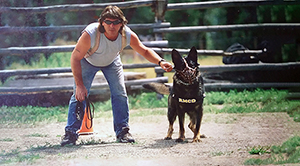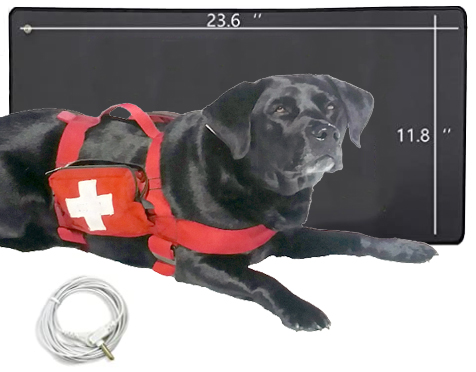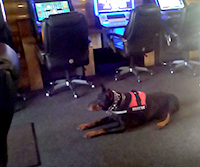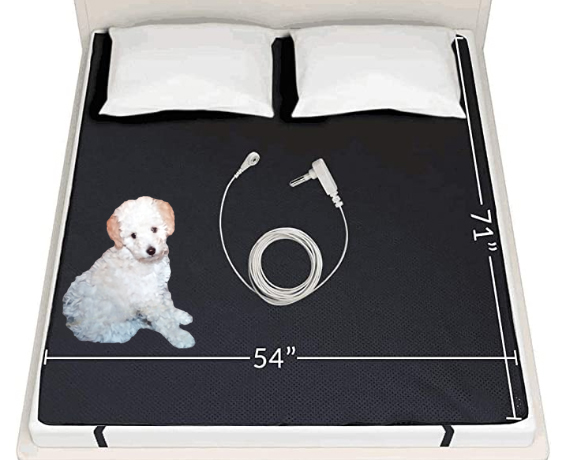To Lisa and Russ Drury of Draper [UT], it is almost a miracle.
Their 7-yr-old daughter, Molly was diagnosed with Asperger's syndrome (a disorder classified on the autism spectrum) four years ago. Although she is high functioning, she sometimes can be non-responsive and unpredictable.
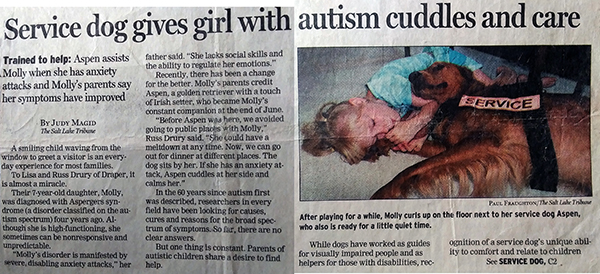
"Molly's disorder is manifested by severe disabling anxiety attacks," her father said. "She lacks social skills and the ability to regulate her emotions."
Recently, there has been a change for the better. Molly's parents credit Aspen, a golden retriever with a touch of Irish setter, who became Molly's constant companion at the end of June.
"Before Aspen was here, we avoided going to public places with Molly." Russ Drury said. "She could have a meltdown at any time. Now, we can go out for dinner at different places. The dog sits by her. If she has an anxiety attack, Aspen cuddles at her side and calms her."
In the 60 years since autism first was described, researchers in every field have been looking for causes, cures and reasons for the broad spectrum of symptoms. So far, there are no clear answers.
But one thing is constant. Parents of autistic children share a desire to find help.
While dogs have worked as guides for visually impaired people and as helpers for those with disabilities, recognition of a service dog's unique ability to comfort and relate to children with autism is relatively new. Specialty training was started about 10 years ago and is regarded as an up-and-coming treatment.
When the Drury's saw an episode of the "Jane Pauley Show" in October about dogs working with autistic childern it opened a door.
Patty Dobbs Gross, founder of Connecticut based NorthStar Foundation, which breeds and places dogs for children with physical and mental challenges, said there were more than 800 emails in response to her appearance on the Pauley program.
"Our dogs are the safety net [of parental vigilance]. More than half of children we serve are affected with autism," she said.
Facing a possible two- to five- year wait for a NorthStar dog, the Drury family did more research and found veteran trainer Hal Steiner at Rocky Mountain Command Dogs in Bozeman, Montana. Steiner suggested they look for a dog and he would train it.
"The dogs are enormously expensive to train, and can cost from $7,000 to $15,000, and more," Russ Drury said, adding that the family could not have paid for the service dog training without a generous private donation.
|
"It took several weeks before we found our dog at the Salt Lake County Animal Shelter," Lisa Drury said. They adopted the dog, named her Aspen, and sent her to Montana.
For Molly's dog, Steiner stressed basic obedience and tracking, using her clothing so Aspen would recognize the girl's scent. When Steiner felt the dog was ready- "it takes time, effort, patience, knowledge and perserverence"- Molly and her family made the successful trip through the Bozeman Mall. Then, they went home. |
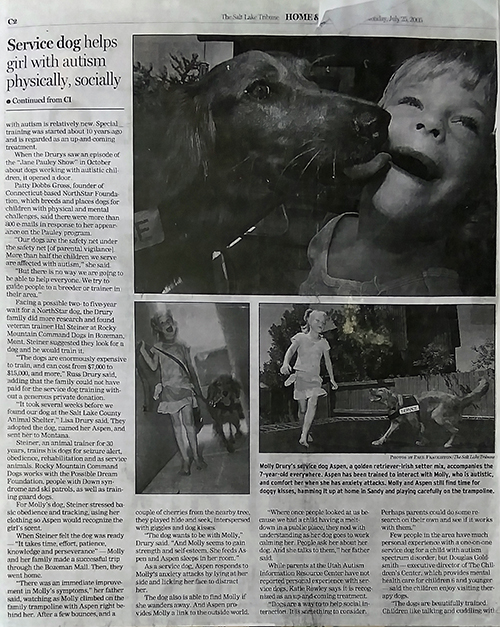 |
"There was an immediate improvement in Molly's symptoms," her father said, watching as Molly climbed on the family trampoline with Aspen right behind her. After a few bounces, and a couple of cherries from a nearby tree, they played hide and seek, interspersed with giggles and dog kisses.
"The dog wants to be with Molly," Drury said. "And Molly seems to gain strength and self-esteem. She feeds Aspen and Aspen sleeps in her room."
As a service dog, Aspen responds to Molly's anxiety attacks by lying at her side and licking her face to distract her.
The dogs also is able to find Molly if she wanders away. And Aspen provides Molly a link with the outside world.
"Where once people looked at us because we had a child having a meltdown in a public place, they nod with understanding as her dog goes to work calming her. People ask her about her dog. And she talks to them," her gather said.
While parents at the Utah Autism information Resource Center have not reported personal experience with service dogs, Katie Rowley says it is recognized as an up-and-coming treatment.
"Dogs are a way to help social interaction. It is something to consider. Perhaps parents could do some research on their own and see if it works with them."
Few people in the area have much personal experience with a one on one service dog for a child with autism spectrum disorder, but Douglas Goldsmith- executive director of the "The Children's Center", which provides mental health care for children 6 and younger- said the children enjoy visiting therapy dogs.

